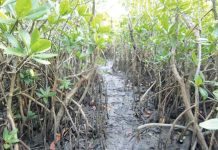
ILOILO City – A “holistic approach” should have been implemented by the Duterte administration in relation to the rehabilitation efforts in Manila Bay, according to a national scientist.
Dr. Lourdes Cruz, a scientist at the National Academy of Science and Technology and a professor emiritus of the University of the Philippines (UP)-Diliman’s Marine Institute, said Manila Bay has a complicated environmental issue that is why an inclusive approach should have been adopted.
Cruz said this during a press briefing in this city last Tuesday for the 1st International Conference on Sustainability 2019 organized by UP-Visayas.
The efforts in restoring Manila Bay’s ecological health should have been consulted with the academe, industries and communities for a sustainable outcome, stressed Cruz.
She added that the government should not only focus on the bay, but as well as the waterways surrounding it.
“Manila bay is a complex problem. Dapat inclusive ang approach. Hindi pwedeng ang Manila Bay lang ang alagaan,” Cruz said.
During heavy downpours, piles of trash – most of them plastic – are ushered to the bay by these waterways, Cruz said.
Moreover, the scientist said self-discipline should also be instilled in communities near the bay, especially in waste disposal.
Despite this, Cruz lauded the government for trying to rehabilitate the world-famous Boracay Island in Malay, Aklan.
She hopes that these environmental rehab efforts would continue and end up with good results.
Cruz said public officials play a big part in implementing sustainable rehabilitation programs.
She added that “cooperation” among incumbent and former officials is needed.
“Cooperation talaga from one politiko at ‘yung papalit. Kung maganda ang program, ipagpatuloy. Walang pikunan,” Cruz said.
Meanwhile, the two-day International Conference on Sustainability introduced the field of sustainability science to the academe, local government units and nongovernment organizations.
It aims to contribute to the achievement of the goals of the United Nations 2030 Agenda for Sustainable Development by fulfilling the following objectives:
* to provide a forum for presentation of perspectives and research in the field of sustainability science
* to encourage and provide a venue for exchange of knowledge and practices between academics and practitioners within all the dimensions of sustainability
* to foster critical and cross-disciplinary discussion on current projects and initiatives to achieve sustainable development goals at the local, national and international levels
* to review and assess the county’s programs and efforts in attaining sustainable development goals, and link this with local and institutional initiatives for sustainability/PN



